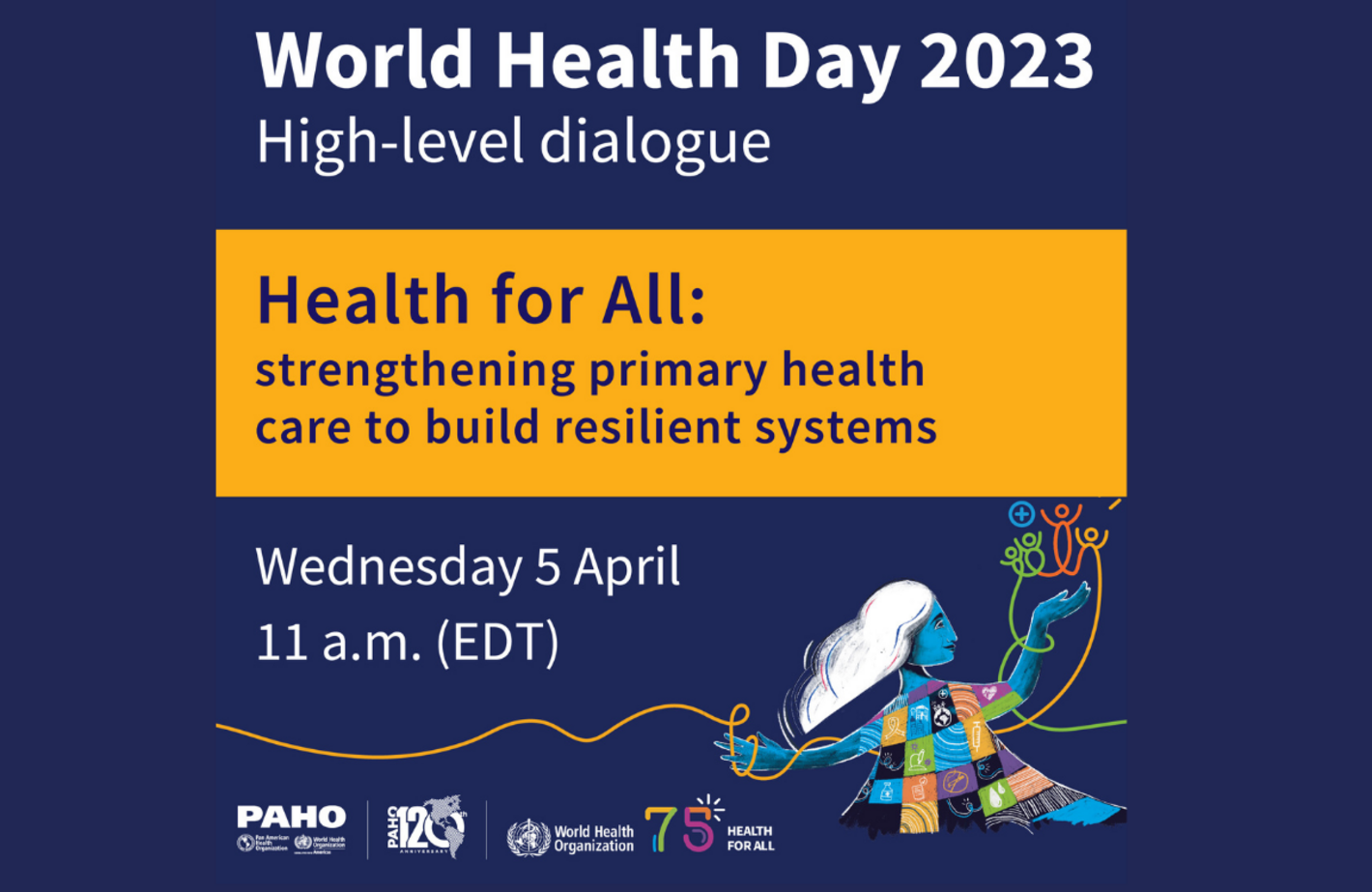
WHEN: Wednesday, April 5, 11:00 am ET (Washington, DC Time).
SUBJECT: World Health Day - Health for All: Strengthening Primary Healthcare to Build Resilient Systems
WHO:
-
Dr. Jarbas Barbosa, Director, PAHO
-
Dr. James Fitzgerald, Director of Health Systems and Services, PAHO
-
Dr. Franck C.S. Anthony, Minister of Health, Guyana
-
Dr. Nisia Trindade Lima, Minister of Health, Brazil
-
Dr. Francisco Alabi, Minister of Health, El Salvador
-
Dr. Jaime Urrego, Vice minister of Public Health, Colombia
-
Lic.Juan Núñez Guadarrama, Coordinator, Mexico Salud-Hable Coalition
Video - Health for all: Strengthening primary healthcare to build resilient systems
PAHO News release
PAHO Director, Ministers of Health of the Americas discuss renewed focus on Primary Health Care
High-level dialogue to mark World Health Day seeks to motivate action to sustainably address the Region’s health challenges by strengthening first level of care.
Background
On April 7th, 2023, the World Health Organization (WHO) will celebrate its 75th anniversary and World Health Day 2023. In this context, the Pan American Health Organization (PAHO) organized a high-level dialogue entitled Health for All: Strengthening Primary Health Care to Build Resilient Systems. The virtual event, to be held on Wednesday, April 5th, 2023, aims to promote reflection on public health achievements that have improved quality of life over the past decades; promote lessons learned, particularly those that have emerged in the context of the COVID-19 pandemic; and motivate action to address today's and tomorrow's health challenges.
Health for all, in the context of the Region of the Americas, is a call to revindicate the right to health as a fundamental human right. It is also a call to reaffirm the commitment to primary health care (PHC) as the cornerstone of sustainable and resilient health systems that move towards universal coverage and universal access to health (Universal Health), as well as towards the fulfillment of the Sustainable Development Goals (SDG) (1–3). The PHC approach has been and continues to be a central element in health system strengthening and transformation initiatives, promoting the participation of all government and societal instances and combining three components: multisectoral policies and measures, the capacity for action and decision-making of individuals and communities; and integrated health services centered on primary care and the renewed Essential Public Health Functions (EPHF).
Social empowerment has been a critical element in confronting the COVID-19 pandemic and its consequences at the local level. Numerous examples of good practices have emerged from the work of organizations and collectives at the local and regional levels in each of the Region's countries. This demonstrates the transformation potential offered by involving and empowering individuals, families, and communities to increase social participation and improve self-care for health. It also calls on decision-makers to continue guaranteeing informed and active participation in which people are at the center of health decisions and outcomes.
Health for all has its roots in the community and our Region's territory. Social and political leadership in support of the right to health and initiatives to strengthen health systems from the PHC approach must adopt a solid territorial perspective and belonging. Integrated Health Service Delivery Networks, one of the primary operational expressions of the PHC approach, can also adopt forms that increase resilience and contribute to achieving universal health (4).
World Health Day is a celebration of citizenship and the global community. It is an opportunity to reaffirm the Region's commitment to the right of all people to enjoy the highest possible level of physical and mental health. In this sense, this activity is aimed at the general public. It features a panel of high-level speakers representing different perspectives: health ministers, government officials, international actors, social organizations, and civil society representatives. We hope that the dialogue can renew the energies and motivations of participants to engage themselves and their communities in health care and social participation activities that lead to strengthening health systems.
Agenda
-
World Health Day 2023 video (WHO)
-
Introduction and moderation of the event led by Dr. James Fitzgerald, Director of the Department of Health Systems and Services, PAHO/WHO
-
Opening remarks
-
Dr. Jarbas Barbosa da Silva Jr., Director, Pan American Health Organization
-
-
High-level dialogue
-
Dr. Frank C.S. Anthony, Minister of Health, Guyana
-
Dr. Nisia Trindade Lima, Minister of Health, Brazil
-
Dr. Francisco Alabi, Minister of Health, El Salvador
-
Dr. Jaime Urrego, Vice minister of Public Health, Colombia
-
Lic. Juan Núñez Guadarrama, Coordinator, México Salud-Hable Coalition
-
-
Closing remarks
-
Dr. Jarbas Barbosa da Silva Jr., Director, Pan American Health Organization
-
References
- Pan American Health Organization. Strategy for Universal Access to Health and Universal Health Coverage. 53rd Directing Council of PAHO, 66th Session of the WHO Regional Committee for the Americas. (Resolution CD53/5. R2). 2014.
- Pan American Health Organization. Compact 30-30-30. PHC for universal health. 2019.
- Pan American Health Organization. Strategy for Building Resilient Health Systems and Post-COVID-19 Pandemic Recovery to Sustain and Protect Public Health Gains. 59th Directing Council. 73rd Session of the Regional Committee of WHO for the Americas. PAHO, 2021.
- Pan American Health Organization. Policy on integrated care for improved health outcomes. 30th Pan American Sanitary Conference. 74th Session of the Regional Committee of WHO for the Americas. 2022.
